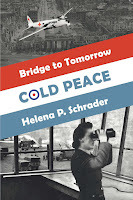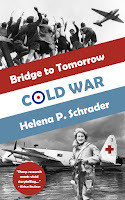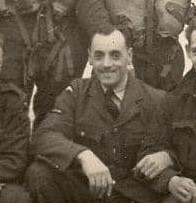Secondary Characters of "Cold War" -- Flight Sergeant Gordon MacDonald
The cast of characters in "Cold War" would not be complete without Gordon MacDonald. His role is perhaps minor in the series as a whole, but as a man in a wheelchair given a chance to be useful again, he personifies how the Airlift gave people hope and purpose again.
Gordon will be more familiar to many readers as "Daddy" MacDonald, the flight engineer on Kit Moran's crew. Gordon came up through the ranks, starting his RAF career as a Halton apprentice at 15. He trained as an aircraft mechanic or fitter and worked his way up the ranks. He married and had two daughters. By the time the war came, he was already a sergeant and soon a crew chief as well.
But he didn't like sending other men off to die and when the chance came, he volunteered for aircrew. It was late 1943 and he'd been in the RAF 18 years, but he had never flown in an aircraft. He was half the way through his flight engineer training course when he went up for the first time, and discovered it terrified him. To admit that and not complete the course, however, might have exposed him to accusations of "lacking moral fibre." So rather than risk being called a coward, he swallowed down his fear and completed the course.
At the Operational Training Unit crews were formed, and most of the young pilots looked a little askance on an "old man" of 33 as MacDonald now was. Or his fear of flying affected the way he interacted with pilots while in the air and had put most of the skippers off. By the end of the second week, MacDonald was without a crew and Kit Moran was without a flight engineer, so "the powers that be" assigned MacDonald to Moran's aircraft. The two men became friends almost instantly.
When on his last operational flight over Germany, Kit recognizes that the Lancaster is too badly damaged to fly back to Allied controlled territory he orders the crew to bale out. Daddy, however, returns to the cockpit to assist Kit. When he realizes there is not time left for them to bale out, he straps Kit in and stays with him. On impact, Gordon's back is broken and he returns to the UK paralyzed from the waist down. Although he receives extensive rehabilitation and physical therapy after repatriation, he is discharged from the RAF as an invalid.
Gordan doesn't blame Moran for his disability. He knows he made the choice to return to the cockpit and he believes firmly that he saved Kit's life by strapping him in. He is proud to have saved Kit's life. His problem is that he hates being idle and 'worthless.' And then Kit brings him a new proposal.
An excerpt with Gordon MacDonald:
Gordon MacDonald deftly folded up the ironingboard and shoved it back in its stowage space beside the refrigerator. He’dlearned how to open it at a height that enabled him to iron from hiswheelchair. Although he still made a hash of tricky items like shirts, he couldmanage dish towels, napkins and the like. With three of the latter on his lap,he wheeled himself to the cramped dining room and put the freshly ironed andneatly folded napkins on the three place settings he’d laid. He paused to surveythe little room, looking for something he’d forgotten. He’d polished the silvertea service, and he’d dusted everything he could reach. Seeing nothing more hecould do, he rolled himself back to the parlour and looked it over critically.
Gordon remembered how pleased he and Maisy hadbeen to move into this house when they married eighteen years ago. Maisy had goneto a lot of effort to find the right furniture and had been proud to inheritthe china service and a proper cabinet to store it in. His parents had giventhem the etchings on the back wall, and his sister had stitched the cushioncovers. The photographs on the mantlepiece recorded the milestones of his life:a big-eared kid grinning at the camera in the uniform of a Halton apprentice, aproud corporal on the arm of Maisy in a white wedding dress, the Christening ofboth daughters, the wedding photo of the eldest, a formal picture of him withsergeant’s stripes and his aircrew brevet, and finally, a crew picture in frontof the Lancaster Z-Zebra. Everything in the room had a memory attached to it;most of them good. It wasn’t the past that hurt, but the future, so he dwelt onthe past.
... No sooner hadhe arranged everything on the coffee table than the doorbell rang. Punctual tothe minute, Gordon thought with an inner smile; that was the Skipper all right.If they were even 30 seconds late over the target, he was unhappy about it. Callingto Maisy that he’d get it, he rolled himself to the entryway and opened thedoor. Kit Moran stood on the doorstep with a large bouquet.
“For the Mrs,” Kit explained with an almostapologetic smile.
“That was thoughtful of you, Skip. Come in,”Gordon pushed himself backwards.
Kit entered, his eyes sweeping hissurroundings, and Gordon found himself mumbling apologies about not being ableto keep it up as he should. “But it’s wonderfully cosy!” Kit assured him, and histone made Gordon start to relax a little. If only he knew why his former pilothad invited himself to dinner.
Leaving Kit in the parlour, Gordon went tofetch a vase and water for the flowers. Together Gordon and Kit together founda place for them and then Kit sat down — only to spring to his feet again whenMaisy arrived. She was still flushed from the heat in the kitchen but withouther apron or scarf. Tall and slender for a woman her age, the strength of herHighland upbringing was reflected in her sharp features and upright bearing.
“We’re so pleased to have you here, FlightLieutenant Moran,” she welcomed him as she shook his hand vigorously. “I onlywish I could have made you a better meal. Who would have thought that threeyears after the Germans surrendered, we’d still be clipping ration coupons! Andnow they’ve even put bread and potatoes on ration as well — like they neverwere in the war. But meat is the worst, you know, I can’t seem to get — why amI babbling on like this? I’m sorry, Flight Lieutenant. Please sit down. We’vegot the cheddar at least.” She indicated the platter.
“Thank you, Mrs MacDonald, and I’m the one whoought to apologise for inviting myself like this, but —”
“Oh, let me get you something to drink, first.What would you like?” Mrs MacDonald broke in to ask, and Gordon could tell shewas nervous because she didn’t usually chatter or interrupt.
Kit took it in his stride and with a glance atGordon asked, “What are you drinking, Gordon?”
“Guinness.”
“Then I’ll have one as well.”
Maisy disappeared and returned with twoglasses and two bottles of beer; she didn’t drink herself. ...
“Now, don’t keep us in suspense any longer, Skip. What is thisall about? There’s nothing wrong at home is there?”
“No. Not at all, but I wanted to tell you inperson about a job I may have. I owe you my life, and I’ve felt so badly aboutbeing unemployed and—”
“Now, don’t go talking like that! You don’thave to be someone important for me to feel it was worth saving you. It’s enoughjust to see you with Georgina and that bairn of yours.”
Whatever Kit had meant to say, Gordon’s remarkthrew him off his stride. Briefly, he was visibly distressed, then he pulledhimself together. “Gordon, I may have a chance to fly on the Berlin Airlift,delivering food to the civilian population.”
“Congratulations!” Gordon sat up straighterand reached out to clap Moran on the knee in sincere delight. “Well done!”
“It’s not certain, however. First, I have to pulltogether a complete crew.”
“Why don’t they assign you one or let you crewup like we did?” Gordon asked confused.
“The job’s not with the RAF. It’s with aprivate company.” ... Kit was looking so earnestly at him that Gordonsensed there was more. “What is it?”
Kit drew a deep breath. “My father-in-law—”
“The reverend?”
“Yes, Reverend Reddings. He claims that coincidencesare the hand of God in human affairs.” Gordon grunted to suggest his scepticismbut waited for Kit to continue. “The company that I may be flying with wants tohire German aircraft mechanics to do the maintenance work. They need a crewchief who could supervise and train the Germans on Hercules VI engines.”
Gordon was puzzled why Moran would mentionthis so solemnly — and then the penny dropped. Something hot seemed to slidedown his inert spine. “You — You — think — I — could do that?” he askedcautiously.
Kit nodded. “I’m sure of it. The knowledge isall there in your head. You don’t need to do the work, just explain it,and make sure the others do it right. I recommended you.”
“Why did you do a daft thing like that?” Gordonexploded feeling overwhelmed. Already he wanted this job so badly, he wasstarting to tremble. Yet, he didn’t want false hopes or charity either. “Whatcompany would want to hire a cripple and why? What’s in it for them? Where’sthe catch?”
Kit looked back steadily, and Gordon sensed thestrength and goodwill that had always drawn him to the younger man. “It’s anair ambulance outfit run by one of McIndoe’s Guinea Pigs and a woman pilotformerly with the ATA. They aren’t your usual profit-driven businessmen.”
“You told them I was in a wheelchair?”Gordon just couldn’t believe it.
“Yes, I did.”
“And they were still interested?”
“Yes.”
“But why? There are lots of other men asqualified as me who aren’t cripples.”
“Well, it seems their British ground crewrefused to remain in Berlin after the blockade started, which is why they decidedto hire Germans. In other words, thisjob would be in blockaded Berlin, and it will only last as long as the blockadedoes. It’s a very temporary and somewhat risky proposition, so few qualifiedcrew chiefs are likely to want it.” Kit explained, adding in a gentle voice,“And no one would be surprised or upset if you said no.”
“I’m not saying no!” Daddy snapped back,frowning. “I’d take any legitimate job, let alone one working withaircraft. And I don’t care about the pay, but I don’t want charity, either. Asfor —” He cut himself off as Maisy reappeared in the doorway.
She looked from one to the other, then handed Kitan opened envelope. “That’s the invitation to the flight engineers’ reunion.It’s going to be held in Warrington a week from tomorrow.”
“Thank you. I was just telling Gordon that thecompany I hope to work for also needs a crew chief to train Luftwaffemechanics. They asked me to find out if Gordon might be interested—”
“Oh! That would be splendid! A job with aircraft again!” She looked at herhusband.
“The work would only be temporary,” Kithastened to explain.
“That doesn’t matter, does it, Gordon?” Maisyanswered turning to her husband with an expression of almost painful eagerness.Turning back to Kit, she declared. “He’s been doing much better since I startedletting him help around the house but working with aircraft and engines — that’shis life. He loves them. It would do him a world of good to get back to them,even if only for a short spell or on an irregular basis. The pay doesn’tmatter. Not with the girls earning their own way now, and with my job payingsteady. How long would it be for?”
“We don’t know. It depends on how long theRussians keep up the blockade of Berlin. The job, I’m afraid, is in Berlin.”
“Oh!” She was taken aback by that but thenturned to look at Gordon. Their eyes met. He didn’t have to say anything.Turning back to Kit she declared. “Ithink Gordon should go.”
Gordon was too overwhelmed for words. All hecould do was reach out and clutch her hand with so much force he saw her wince.
She did not pull away, however. Instead, shedeclared firmly and steadily. “I want you to do this. It’s what’s meant to be.”
Gordon is a character in all three volumes of the Bridge to Tomorrow Trilogy

The first battle of the Cold War is about to begin....
Berlin 1948. In the ruins ofHitler’s capital, former RAF officers, a woman pilot, and the victim of Russianbrutality form an air ambulance company. But the West is on a collision coursewith Stalin’s aggression and Berlin is about to become a flashpoint. World WarThree is only a misstep away. Buy Now
Berlin is under siege. More than twomillion civilians must be supplied by air -- or surrender to Stalin's oppression.
USAF Captain J.B. Baronowsky and RAF FlightLieutenant Kit Moran once risked their lives to drop high explosives on Berlin.They are about to deliver milk, flour and children’s shoes instead. Meanwhile,two women pilots are flying an air ambulance that carries malnourished andabandoned children to freedom in the West. Until General Winter deploys on theside of Russia. Buy now!
Based on historical events, award-winning and best-selling novelistHelena P. Schrader delivers an insightful, exciting and moving tale about howformer enemies became friends in the face of Russian aggression — and how closethe Berlin Airlift came to failing.
Winning a war with milk, coal and candy!




